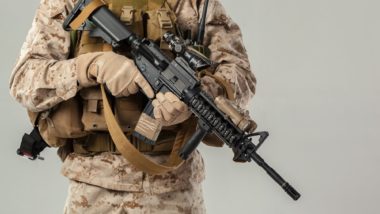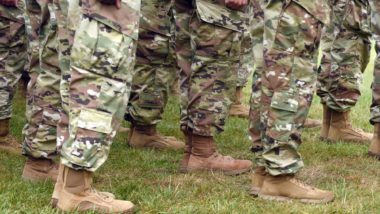Top Class Actions’s website and social media posts use affiliate links. If you make a purchase using such links, we may receive a commission, but it will not result in any additional charges to you. Please review our Affiliate Link Disclosure for more information.
Over 640 injury lawsuits citing 3M military earplugs as the cause of action have been assigned to a U.S. district court in Pensacola, Fla. The cases are part of multidistrict litigation (MDL) against Minnesota-based 3M, which allegedly manufactured and sold a product to the Department of Defense it knew to be defective.
The plaintiffs are military veterans who have suffered significant hearing loss or tinnitus, which they attribute to the 3M’s earplug product.
The cases will be overseen by Judge M. Casey Rodgers, whom the Judicial Panel on Multidistrict Litigation has determined to be “…an able jurist with experience in presiding over a large products liability MDL.” Judge Rodgers recently finished presiding over an MDL involving Abilify, an antipsychotic drug believed to cause patients to engage in compulsive behaviors.
3M recently paid $9.1 million to settle a case brought by the U.S. Department of Justice over the earplugs.
What Are 3M Military Earplugs?
The allegedly defective ear protection product at the heart of the current MDL is known as the Combat Arms Earplugs (CAE v2), which have been used in training as well as on the battlefield. It was originally designed and produced by Aearo Technologies, which was taken over by 3M for $1.2 billion in 2008.
These 3M military earplugs were of a green and yellow, double-ended design. When the green end was inserted, it was supposed to block all sound; insertion of the yellow end reduced the sounds of gunfire and explosives but still allowed service personnel to hear orders and engage in conversations.
A growing number of veterans are coming forward, claiming that they were also issued these earplugs during their service and have since been affected by hearing loss, tinnitus, or both. In many cases, these veterans are very young to naturally be presenting hearing loss issues.
Of course, other elements of military service may contribute to hearing loss problems, such as noise from ordnance and machinery.
Hearing problems have long been a consequence of military service—indeed, statistics provided by the Centers for Disease Control show that veterans are 30 percent more likely than non-veterans to experience severe hearing impairment.

3M Earplugs and Hearing Problems
Two problems have been associated with the allegedly defective earplugs: hearing loss and tinnitus.
Tinnitus, according to the Mayo Clinic, is a condition that causes a person to perceive phantom noises in their ears, such as ringing, buzzing, clicking, or humming. For some, tinnitus can become so severe that it causes real interruptions in their day to day life. Brig. Gen. William Gothard, an Army veteran who served for 36 years to San Diego news outlet KPBS that he has been left with hearing loss and tinnitus.
“It sounds like a chorus of cicadas sitting on your shoulders constantly, and the less ambient noise around, the worse that tinnitus is,” he told KPBS. The earplugs Gothard was issued while in the military may have contributed to his hearing problems – an issue that the company settled a lawsuit with the Pentagon over.
3M Settles with Pentagon
Plaintiffs claim that both Aearo and 3M were aware of a design defect that allowed the earplugs to come loose as far back as 2000. According to the complaints, Aearo, the company who developed the earplugs and was later purchased by 3M, had used its own employees to test the product. When they failed to meet the required standards, the original manufacturer came up with a modification that enabled them to obtain federal contracts.
Plaintiffs, however, say that 3M did not inform them of either the defect or how to modify the product.
A recent military hearing loss lawsuit over defective earplugs has ended with a $9.1 million settlement between manufacturer 3M Company and the Pentagon, bringing an end to the claims without the company admitting any liability.
The specific device named in the lawsuit, as in the MDL, is the Dual-Ended Combat Arms Earplugs Version 2, which were allegedly too short for proper insertion, leading to loosening and failure to perform as necessary. Complaints on the devices say they are subject to disengaging or loosening to a degree which allowed significant noise to go around the device.
The 3M company didn’t disclose any of these problems when attempted to sell the product under contract with the military and thus violated the federal False Claims Act (FCA).
The enforcement action was initiated under the qui tam provision of the FCA by a whistleblower who alleged that a type of dual-ended 3M combat arms earplugs referred to by the number CAEv2 was defective. When this inside information was confidentially supplied to the DOJ, the agency was given an opportunity to decide whether or not to take on the combat arms earplugs case on behalf of the federal government.
The government filed its lawsuit against 3M Company and Aearo Technologies, the original manufacturer of the earplugs before being purchased by 3M. The lawsuit alleged that the companies were aware that the earplugs were defectively designed, but failed to disclose this information.
The money from the lawsuit went to the government—as well as to the whistleblower who brought the issue to the attention of the government, who received $1,911,000 from the settlement.
Unfortunately, military service members who used the earplugs and have been affected by these hearing issues still have not been compensated.
According to a Department of Justice news release, the review of allegations and evidence which led to the 3M earplug settlement was a collaboration between DOJ’s Civil Division, the U.S. Attorney’s Office for the District of South Carolina, the Army Criminal Investigation Command, and Defense Criminal Investigative Service (DCIS). The DOJ says they are committed to weeding out waste and protecting the men and women of the military from defective equipment such as these combat arms earplugs.
The allegations said that 3M and the company which preceded it were well aware of the defects associated with the combat arms earplugs in question, yet still foisted them on to the Defense Logistics Agency.
Individual Lawsuits Also Allege Serious 3M Earplug Defect
Another lawsuit was filed on Jan. 22, 2019 by Sgt. Scott R. in U.S. District Court in Waco, Texas concerning the allegedly defective 3M combat arms earplugs spell out the experience that members of the military have had after using them. According to the Killeen Daily Herald, the sergeant says that the faulty protective devices caused him to develop a chronic condition of ringing in the ears which is commonly known as tinnitus. He has also purportedly experienced hearing loss and issues with balance and vertigo.
The sergeant, who says he rarely experiences a moment of peace because of the constant high-pitched noise in his ears secondary to tinnitus, told reporters that the combat arms earplugs were issued to him prior to deployment to Iraq. In Iraq, as in most war zones, he was subject to loud noises of weaponry discharge. He was unaware of the failure of the earplugs until he returned home and experienced the ringing sounds and hearing loss in day-to-day life.
He is represented by his former platoon leader, who is now a Waco-area attorney. The attorney says he too has hearing issues secondary to the earplugs in question, but says his symptoms are much less pronounced than his client or many other soldiers.
The Tip of the Iceberg?
Although the number of plaintiffs in the current MDL proceedings now stands at 640, injury lawyers across the country are predicting that the number could eventually reach tens or even hundreds of thousands.
Currently, the Veterans Health Administration is spending over a billion dollars a year treating veterans for hearing problems. According to one estimate, ear damage attributable to defective 3M military earplugs affects approximately 800,000 veterans of combat actions in Afghanistan and Iraq.
“Due to the widespread damage caused to veterans by 3M’s actions, these cases are just the tip of the iceberg of lawsuits that will be filed in order to hold 3M accountable,” one of the attorneys involved in the litigation said in a statement.
A Chicago injury lawyer who represents nine plaintiffs said, “These are people who served our country honorably in very dangerous conditions and are suffering life-changing injuries as a result of the company’s misconduct.”
In response to the allegations, a 3M spokesperson wrote in an email, “3M has great respect for the brave men and women who protect us around the world. We have a long history of serving the U.S. military, and continue to sell safety products to help our troops.”
Filing a Military Hearing Loss Lawsuit
Typically, violations against the False Claims Act (FCA) live in the realm of medical professionals that file claims fraudulently against public health programs such as Medicare and Medicaid. The FCA applies to all government contractors which attempt to defraud the government by wasting taxpayer dollars, however, and military contracting is another common source of FCA claims.
“Through rigorous enforcement of the False Claims Act, we protect taxpayer dollars from waste, fraud, and abuse,” said Sherri Lydon, the U.S. attorney for the District of South Carolina. “And in this case, in particular, we are proud to defend the integrity of our military programs and ensure that our men and women in uniform are adequately protected as they serve our country.”
Are you a current or former member of the U.S. military and have suffered from hearing loss, tinnitus, or other hearing issues after being issued military earplugs between 2002 and 2015? You may be able to file a military hearing loss lawsuit under the FCA. Of course, filing a lawsuit cannot take away the pain and suffering caused by these issues, but it can at least offer some compensation for medical expenses, lost wages, and more.
Do YOU have a legal claim? Fill out the form on this page now for a free, immediate, and confidential case evaluation. The attorneys who work with Top Class Actions will contact you if you qualify to let you know if an individual 3M Ear Plug lawsuit or military hearing loss class action lawsuit is best for you. [In general, 3M Ear Plug lawsuits are filed individually by each plaintiff and are not class actions.] Hurry — statutes of limitations may apply.
ATTORNEY ADVERTISING
Top Class Actions is a Proud Member of the American Bar Association
LEGAL INFORMATION IS NOT LEGAL ADVICE
Top Class Actions Legal Statement
©2008 – 2024 Top Class Actions® LLC
Various Trademarks held by their respective owners
This website is not intended for viewing or usage by European Union citizens.
Get Help – It’s Free
Join a Free 3M Ear Plugs Class Action Lawsuit Investigation
If you qualify, an attorney will contact you to discuss the details of your potential case at no charge to you.
PLEASE NOTE: If you want to participate in this investigation, it is imperative that you reply to the law firm if they call or email you. Failing to do so may result in you not getting signed up as a client or getting you dropped as a client.













